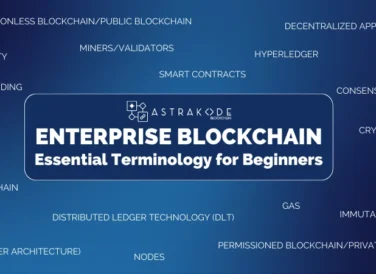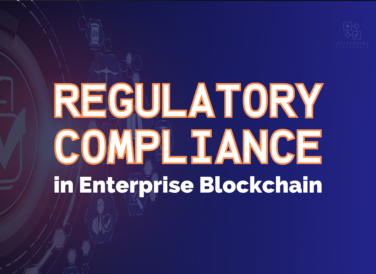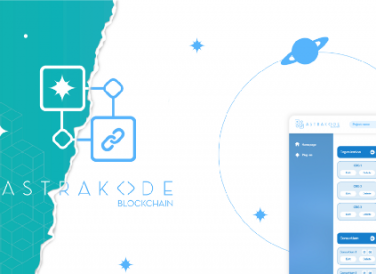Imagine if companies could share information and conduct business on a secure digital network where transactions are permanently recorded and can’t be altered. This network acts like an unchangeable ledger that gives companies transparency and trust. Well, this is exactly what enterprise blockchain platforms enable!
An enterprise blockchain platform is a distributed ledger technology tailored for business environments. While some blockchains, that are public, like Ethereum, offer open and unrestricted version and are making evolutionary strides in enterprise directions. Enterprise blockchains typically operate under a permissioned structure. This ensures businesses have greater control over participants, enabling enhanced security, privacy, and scalability tailored to their specific operational needs.
Enterprise blockchain platforms allow companies to develop customized blockchain networks with controlled participation and governance. Key attributes include restrictive access, permissioned nodes, data privacy, higher transaction throughput, and tailored consensus mechanisms. Leading enterprise platform providers offer on-demand node deployment, management dashboards, support services, integrations with legacy systems, and tools for smart contract development and application building.
By leveraging an enterprise blockchain platform, organizations can adopt blockchain technology at scale in a more controlled manner suited for business ecosystems. Industries from finance, insurance, healthcare to supply chain can benefit from customizable blockchain networks for use cases ranging from asset digitization to contract automation. For enterprises, these platforms enable tapping into blockchain’s potential while still maintaining the security, privacy, and transaction performance needed for operational systems.
Enterprise blockchains give companies a trusted digital environment to share information and conduct business transactions. Participating companies can:
- Safely share data or assets on the blockchain without exposing sensitive information publicly.
- Automate processes and agreements between network members through smart contracts.
- Permanently record transactions in a shared ledger visible to authorized participants only.
- Conduct fast, international transactions without intermediaries.
Essentially, enterprise blockchains establish a secure digital business ecosystem for trusted collaboration and innovation.
Choosing the right blockchain platform is like finding the perfect tool for the job. The platform must align with your business needs and support your goals. When evaluating options, here are some of the most important features to consider:
- Performance and Scalability
The platform should be able to scale as your business grows. Look for features like sharding that allow the network to process high transaction volumes without congestion. Speed is also key – ensure latency and response times meet your requirements. Financial enterprises may need very fast settlement.
Robust encryption, access controls, and data privacy measures are essential for securing sensitive information. Features like zero-knowledge proofs and private channels/ledgers provide transactional privacy when needed.
The ability to integrate and interact with external systems and other blockchains is crucial for cross-organizational workflows. Assess available APIs, connectors, and DevOps capabilities.
Read more on —>Blockchain Interoperability: Exploring Layer 2, Swaps, Bridges and Interconnected Ecosystems
Review the consensus mechanisms available such as PoW, PoS, etc. Also understand the governance model – who controls upgrades, policies, smart contract logic, and other parameters.
The platform should provide the flexibility to tailor solutions to your needs. Modular architectures, configurable settings, and expandable components add customizability.
Analyze both upfront and ongoing costs like license fees, operational expenses, and transaction charges. Ensure the pricing model aligns with your budget and ROI goals.
An active user community indicates maturity. Review the availability of documentation, training, and expert support. These accelerate adoption and development.
If your industry is regulated, ensure available features can address relevant compliance requirements like transaction transparency, auditing, access controls, etc.
Read more on —> Regulatory Compliance in Enterprise Blockchain
An intuitive user interface and developer tools like SDKs and APIs make the platform easier to use and integrate with. This improves user adoption and productivity.
Evaluating platforms against these key considerations will help you determine the best fit for your enterprise blockchain needs and objectives.
Accelerate your enterprise blockchain innovation with AstraKode’s low-code platform—>Sign up free!
In the vast blockchain market, several platforms stand out as leaders in the enterprise arena. Think of these platforms as the top contenders in a technological race, each offering unique features tailored to different needs. Let’s delve deeper into the top enterprise blockchain platforms and understand their unique propositions.
Choosing the right enterprise blockchain platform is a strategic decision that lays the foundation for building customized distributed ledger solutions aligned with your business needs.
Leading enterprise blockchain platforms each offer differentiated capabilities that are purpose-built to address specific technical and operational requirements.
This section provides a comparative analysis of dominant enterprise blockchain platforms against key architectural considerations. By comparing capabilities and limitations, organizations can make an informed decision on foundational technology and infrastructure for decentralized solutions.
Selecting an enterprise-grade platform is akin to combining the ideal ingredients for a recipe – the components profoundly influence the end result. This evaluation aims to help enterprises find the blockchain technology uniquely fitted for their needs and future roadmap.

1. Ethereum: The Pioneer of Blockchain Apps
- Description: Ethereum is like the Swiss army knife of the blockchain world. Versatile and adaptive, it is the pioneer of the open-source blockchain platform. Often associated with the Ethereum blockchain, Ethereum is the go-to for many blockchain projects aiming to implement blockchain solutions.
- Features: Beyond its fame for smart contracts, Ethereum has a huge community. This means a plethora of resources, blockchain experts, and developmental tools. The impending Ethereum 2.0 promises better scalability solutions, making it even more enticing for enterprise Ethereum use cases.
- Use Cases: From kickstarting the DeFi revolution in financial services to supply chain transparency and beyond, Ethereum’s flexibility makes it fit for numerous enterprise applications.
- Global Presence: With the Ethereum enterprise alliance, Ethereum has established itself as a major player in the global marketplace for enterprise blockchain.
Develop Ethereum-based smart contracts with AstraKode—> Sign up free!
2. Hyperledger Fabric: The Permissioned Blockchain
- Description: Think of Hyperledger Fabric as the tailored suit of the blockchain platforms. Created by the Linux Foundation, it’s a bespoke solution that caters to the privacy requirements in the enterprise. Often seen as one of the top blockchain solutions, Hyperledger Fabric is not your regular public blockchain network.
- Features: This permissioned blockchain platform boasts a modular architecture. This means businesses can craft their unique blockchain framework, integrating only the features they need. And with the IBM blockchain platform being a major contributor, the IBM blockchain platform makes development more streamlined than ever.
- Use Cases: From supply chain to finance, its emphasis on privacy and customization makes it apt for scenarios where there’s a need for controlled visibility of transactions on the blockchain network.
- Associations: With its ties to the Linux Foundation, and collaborations with tech giants, Hyperledger stands at the forefront of enterprise blockchains.
Leverage Hyperledger with AstraKode Blockchian—> Sign up free!
3. Corda: Privacy for Industries like Healthcare
- Description: Imagine a platform designed keeping businesses in mind from the word ‘go’. That’s Corda for you. It is the result of a blockchain initiative by R3 to meet the unique demands of businesses.
- Features: Corda has a one-of-a-kind approach to ensuring privacy. Its notary mechanism ensures that only the parties involved in a transaction are privy to it. Moreover, its strong focus on blockchain interoperability ensures seamless communication across different platforms.
- Use Cases: Given its design, Corda shines bright in areas where transactional privacy and verifiability are paramount. Whether it’s healthcare, where patient data security is essential, or trade finance requiring secure multi-party transactions, Corda proves to be a worthy contender.
- Recognition: Being a product of R3, Corda enjoys the trust and recognition of numerous banks and financial services, emphasizing its potential as a leader in the enterprise blockchain technology realm.
4. Ripple: Enterprise Blockchain Solution for Global Payments
- Description: Ripple is akin to the high-speed train in the world of enterprise blockchain platforms. Originating in 2012 as Opencoin and undergoing a rebranding in 2015, Ripple has been at the forefront of transforming global payments.
- Features: Ripple’s unique proposition is RippleNet, a revolutionary network that connects various financial entities, offering almost free global transactions, and eliminating notorious chargebacks. Moreover, Ripple’s cryptocurrency, XRP, stands as a testament to the platform’s capabilities. With transaction speeds dwarfing many counterparts and processing up to 1,500 transactions per second, XRP showcases efficiency and scalability in the blockchain for business realm.
- Use Cases: Ripple’s versatility is reflected in its applications. From cross-border payments with xCurrent, optimizing liquidity costs through xRapid, to enabling payments across diverse networks via xVia, Ripple stands as a beacon for financial services aiming to implement blockchain.
- Global Presence: Ripple’s influence is undeniably expansive, with over 100 financial institutions turning to it to enhance their payment infrastructure. Its digital footprint is not just limited to blockchain deployments but extends to transforming the global blockchain payment landscape.
5. Quorum: Enterprise-focused Version of Ethereum
- Description: Born out of J.P. Morgan’s vision and leveraging Ethereum’s prowess, Quorum is a testament to the blending of corporate foresight with blockchain innovation. It’s Ethereum, but fine-tuned for the enterprise sector.
- Features: Departing from the conventional Proof of Work (PoW) consensus algorithm, Quorum employs a voting-based system and other innovative algorithms. This enables it to churn out hundreds of transactions per second, tailored to the specific configuration of smart contracts and networks. Its design, while bespoke for enterprises, retains the essence of Ethereum, ensuring it benefits from the continuous evolution of the Ethereum blockchain.
- Use Cases: Quorum shines in scenarios demanding swift, high-throughput processing of private transactions within a permissioned participant environment. Be it finance, supply chain, or any domain requiring efficient transaction processing, Quorum presents itself as one of the top enterprise blockchain platforms.
- Philosophy and Adoption: Upholding the spirit of open-source innovation, Quorum, like Ethereum, is open-sourced and encourages experimentation. Its inception and backing by J.P. Morgan underline its credibility and potential in enterprise blockchains.
6. Algorand: Next-gen Efficiency in Blockchain
- Description: Algorand has emerged as a frontrunner in the blockchain ecosystem with its promise of solving the “blockchain trilemma” – achieving decentralization, security, and scalability simultaneously.
- Features: At its core, Algorand boasts a unique consensus mechanism called Pure Proof-of-Stake (PPoS), which ensures full participation, protection, and speed within a truly decentralized network. Its open-source blockchain platform is designed to aid enterprise applications in achieving new levels of efficiency.
- Use Cases: Algorand’s strength lies in its ability to support various blockchain projects, from decentralized finance (DeFi) platforms to government systems. This makes it a top choice for businesses aiming to implement blockchain solutions that demand high-speed and secure transactions.
- Algorand’s approach has garnered the attention of numerous blockchain initiatives worldwide, emphasizing its significance in the global blockchain space and its capacity to support enterprise-grade blockchain deployments.
7. IOTA: Beyond Blockchain with the Tangle
- Description: IOTA operates on a unique ledger system called the Tangle, which deviates from traditional blockchains. This innovation aims to address scalability issues and transaction fees associated with traditional blockchain systems.
- Features: The Tangle doesn’t operate with blocks, making the system inherently scalable. This design ensures zero transaction fees, making microtransactions highly feasible. Furthermore, IOTA’s platform offers quantum-resistant cryptographic algorithms, ensuring a future-proofed blockchain infrastructure.
- Use Cases: IOTA finds its strength in the realm of the Internet of Things (IoT). From supply chain tracking to smart cities and healthcare, IOTA is paving the way for blockchain to streamline enterprise solutions in sectors that demand real-time data transactions.
- IOTA’s unique approach has garnered interest from various sectors, underlining its position as one of the prominent blockchain platforms shaping the future of decentralized technology.
8. VeChain: Revolutionizing Supply Chain & Business Ecosystems
- Description: VeChain positions itself as more than just a blockchain platform. Its vision encapsulates the integration of blockchain technology with real-world applications, particularly in supply chain management and business processes.
- Features: VeChain offers a dual-token system – VET and VTHO, to separate the cost of using the blockchain from speculation. This system is designed to ensure stability in transaction fees. Moreover, its ToolChain platform provides a suite of tools that enable even those unfamiliar with blockchain technologies to integrate and build solutions on VeChain.
- Use Cases: VeChain’s forte is its blockchain for business applications, particularly in the realms of luxury goods, agriculture, logistics, food safety, and more. Its ability to offer transparency, traceability, and efficiency has made it a go-to blockchain company for many enterprises.
- Global Impact: With partnerships spanning various industries and continents, VeChain’s influence in the blockchain market is undeniable, marking it as one of the best enterprise blockchain platforms available today.
9. Sidechains and L2 blockchain platforms:
- Description: Sidechains are separate blockchains that connect to a main blockchain. L2 blockchain platforms are solutions built on top of a main blockchain. Both enable faster, cheaper transactions by taking them off the mainchain but keeping the mainchain’s security.Think of sidechains and L2 as extra playgrounds next to the main playground. They have their own equipment and rules. But they are connected through a gate, so you can move safely between them. You want to use the side playgrounds for activities that are faster or cheaper. But the main playground is still needed for overall security and supervision.Sidechains and L2 give you the best of both worlds – the customization and speed of new playgrounds alongside the security of the original. This makes them powerful blockchain platforms.
- Features: Sidechains operate with their own consensus while inheriting security from the mainchain. L2 enables off-chain transactions while using mainchain for settlement. Both allow surging transaction throughput, lower fees, and flexible governance.
- Use Cases: Payment processing, DEXs, and enterprise systems are ideal use cases given the need for speed, cost efficiency, and customization. Highly applicable for any application needing scale beyond mainchain constraints.
- Adoption: Leading sidechain projects include Polygon, Skale, and Binance Chain. The top L2 platforms are Optimistic Rollups, ZK Rollups, and state channels on Ethereum. Usage is surging as projects port over to leverage flexibility.
Allowing projects to customize their own blockchain infrastructure but derive security from mainchains, sidechains, and L2 solutions offers the best of both decentralization and performance. This powerful combination underpins their rise as adoption accelerates.
As we saw above, each platform offers a world of possibilities, but the best choice will always depend on the specific needs of your business. As the blockchain is evolving, it’s essential to stay updated with the latest advancements and blockchain deployments to ensure the chosen platform aligns with the ever-changing demands of the enterprise world. Remember, the goal is not just to use blockchain, but to use it effectively!
Choosing a blockchain platform is like finding the perfect tool for your needs. The right one can help transform your business. But how do you pick from the many options out there?
First, understand your business requirements. Do you need a public or private network? What features are critical – speed, privacy, flexibility? Clarify your use case – supply chain tracking? Digital asset transactions?
Then, assess the leading platforms. For example, Ethereum enables public decentralized apps. Hyperledger Fabric offers permissioned blockchains. Corda focuses on privacy for finance and healthcare. Each has strengths for different needs.
Also, evaluate the technology. Does the consensus mechanism like PoW or PoS fit your goals? How scalable and interoperable is the platform? What security and developer features are available?
Finally, consider costs. Analyze license fees, setup expenses, and required developer resources. Ensure the platform aligns with your budget.
Choosing the right blockchain is a strategic decision. However, by focusing on your specific business needs and comparing provider capabilities, you can confidently select the optimal platform to drive innovation. Partner with experts to guide your blockchain journey. The possibilities are endless!





